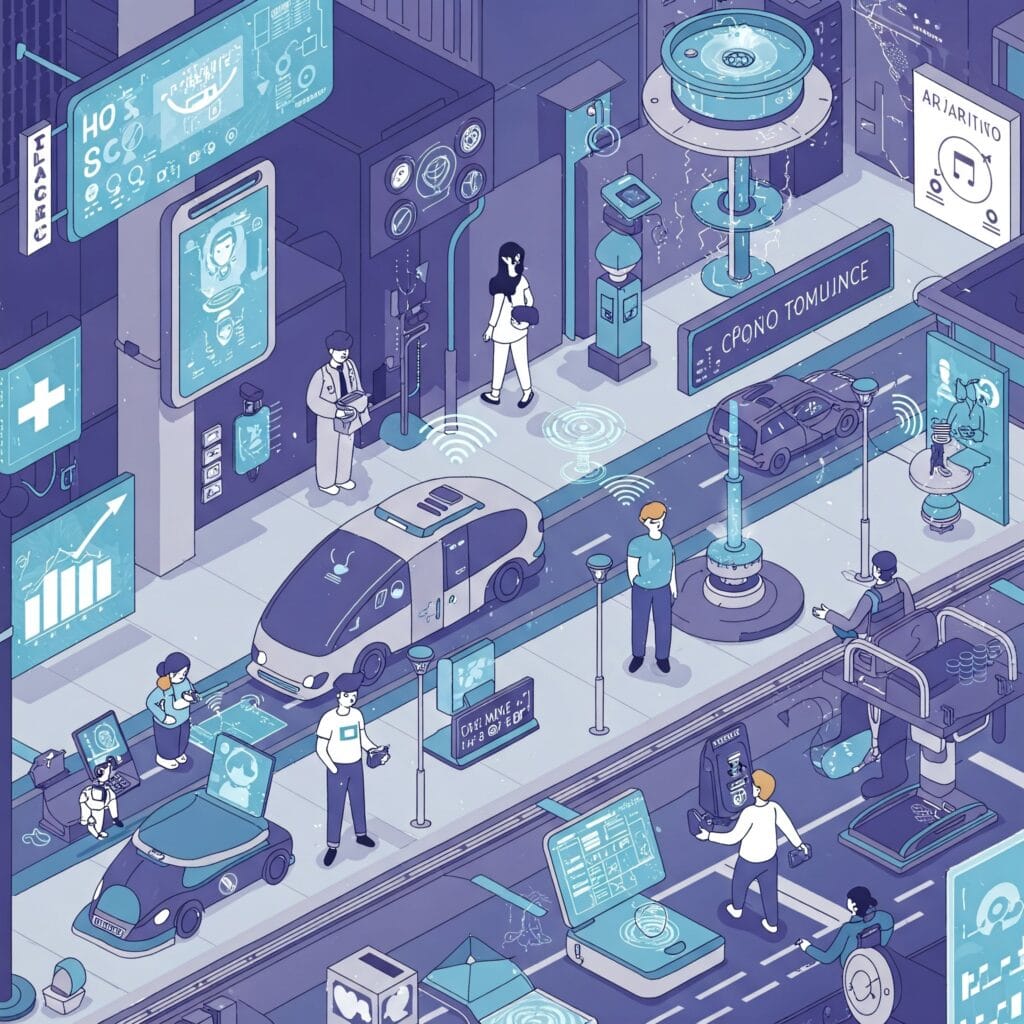How Quantum Computing Will Revolutionize Daily Life in 2025
Discover how quantum computing will reshape daily life in 2024. Explore the exciting applications and future benefits of this groundbreaking technology. Learn more now!

Table of Contents
- Introduction: The Rise of Quantum Computing
- How Quantum Computing Works
- The Impact of Quantum Computing on Everyday Life
- Quantum Computing and the Future of Work
- Quantum Computing and Artificial Intelligence
- The Role of Quantum Computing in Sustainability
- Challenges Facing Quantum Computing
- Key Takeaways
- FAQs
Introduction: The Rise of Quantum Computing
Quantum computing is one of the most exciting and revolutionary technologies that promises to change the world as we know it. But what exactly is quantum computing, and how will it impact our daily lives in the near future? With advancements occurring rapidly, it’s essential to understand the capabilities of quantum computing and how it will shape the future of various industries.
As a technology, quantum computing promises to solve complex problems that classical computers could never tackle. From improving medical treatments to changing how we approach environmental sustainability, quantum computing is expected to create groundbreaking opportunities.
In this blog post, we’ll explore how quantum computing will influence daily life by examining its applications, benefits, and challenges. By the end, you’ll have a clear understanding of how this emerging technology will change the world in 2024 and beyond.
How Quantum Computing Works
Before delving into how quantum computing will impact our daily lives, it’s important to understand the basics of how it works.
1. The Quantum Bits (Qubits)
Unlike classical computers, which use bits to represent information as 0s or 1s, quantum computers use quantum bits or qubits. Qubits can exist in multiple states at once, a phenomenon known as superposition. This allows quantum computers to process information exponentially faster than classical computers, making them suitable for solving problems that require immense computational power.
2. Quantum Entanglement
Another key principle behind quantum computing is quantum entanglement. When qubits become entangled, the state of one qubit instantly affects the state of the other, no matter the distance between them. This enables quantum computers to perform calculations in parallel, making them incredibly efficient.
3. Quantum Algorithms
Quantum computers use specialized algorithms to perform complex calculations. These algorithms are designed to exploit the unique properties of quantum mechanics, allowing quantum computers to solve problems more efficiently than classical computers.
The Impact of Quantum Computing on Everyday Life
As quantum computing continues to advance, its applications will become more integrated into our daily lives. Let’s look at some of the most significant areas where quantum computing will make a difference.
In Healthcare
Quantum computing is expected to revolutionize healthcare by enabling faster and more accurate drug discovery, personalized treatments, and improved diagnostics.
Drug Discovery and Development
Quantum computers can simulate molecular structures and chemical reactions much faster than classical computers, accelerating the drug discovery process. This will lead to the development of new treatments for diseases like cancer, Alzheimer’s, and rare genetic disorders.
Personalized Medicine
Quantum computing can also help create personalized treatment plans by analyzing large amounts of genetic data. With this technology, doctors will be able to tailor treatments to individual patients, increasing the likelihood of successful outcomes.
In Transportation
Quantum computing has the potential to transform the transportation industry by optimizing traffic patterns, improving logistics, and enhancing autonomous vehicle systems.
Traffic Optimization
Quantum computers can analyze vast amounts of data in real-time, allowing them to optimize traffic flow and reduce congestion. This could lead to more efficient transportation networks, cutting down travel time and reducing carbon emissions.
Autonomous Vehicles
Quantum computing will also play a crucial role in the development of autonomous vehicles. Quantum algorithms can process complex data from sensors and make real-time decisions, improving the safety and efficiency of self-driving cars.
Quantum Computing and the Future of Work
Quantum computing will have a significant impact on the workforce, creating new job opportunities while also reshaping existing industries. Let’s explore how quantum computing will affect the future of work.
New Jobs in Quantum Computing
As quantum computing evolves, there will be a growing demand for professionals with expertise in quantum mechanics, quantum algorithms, and quantum hardware. This will create new job opportunities in fields like quantum software development, quantum engineering, and quantum research.
Industry Disruption and Job Transformation
Quantum computing will also disrupt various industries, leading to the transformation of existing job roles. For example, in fields like data analysis and cybersecurity, quantum computing will enable more efficient methods for processing and securing data, changing the way professionals in these fields work.
Quantum Computing and Artificial Intelligence
Quantum computing and artificial intelligence (AI) are two technologies that are expected to complement each other, driving advancements in a wide range of sectors.
Enhanced AI Algorithms
Quantum computing can significantly enhance AI algorithms by providing the computational power needed to process massive datasets more efficiently. This will lead to more accurate and faster machine learning models, which can be applied in areas such as healthcare, finance, and autonomous systems.
Quantum-Enhanced Machine Learning
With quantum computing, machine learning models will be able to solve problems that were previously too complex for classical computers. For example, quantum-enhanced machine learning could be used to optimize supply chains, predict consumer behavior, and improve recommendation systems.
The Role of Quantum Computing in Sustainability
Quantum computing has the potential to play a vital role in addressing some of the world’s most pressing sustainability challenges, such as climate change and resource management.
Climate Change Modeling
Quantum computers can simulate complex climate models with unprecedented accuracy, enabling scientists to better predict the effects of climate change. This could lead to more effective strategies for mitigating climate impacts and developing clean energy solutions.
Optimizing Resource Usage
Quantum computing can also help optimize the use of natural resources by modeling systems like energy grids, water distribution networks, and supply chains. This will lead to more efficient resource management and reduced waste.
Challenges Facing Quantum Computing
While quantum computing holds enormous promise, there are several challenges that need to be addressed before it can reach its full potential.
Quantum Error Correction
One of the biggest challenges in quantum computing is quantum error correction. Quantum computers are highly sensitive to environmental factors, and even small disturbances can cause errors in calculations. Researchers are working on developing error-correcting algorithms to address this issue.
Hardware Limitations
Building quantum computers with enough qubits to solve real-world problems is another significant challenge. Current quantum computers have relatively few qubits, and scaling up the technology to build large-scale quantum computers will require advances in quantum hardware.
Key Takeaways
- Quantum computing is a game-changing technology that will revolutionize multiple industries, from healthcare to transportation, by offering faster processing and solving complex problems.
- It will create new job opportunities in fields like quantum software development and quantum engineering, while also transforming existing industries.
- Quantum computing and AI will work together to create more powerful machine learning algorithms and improve sectors like healthcare, finance, and autonomous systems.
- Challenges such as quantum error correction and hardware limitations need to be addressed for the widespread adoption of quantum computing.
FAQs
1. How will quantum computing impact healthcare? Quantum computing will speed up drug discovery, enable personalized treatments, and improve diagnostics by processing vast amounts of genetic and molecular data.
2. What industries will benefit most from quantum computing? Industries like healthcare, transportation, AI, and sustainability will see significant benefits from quantum computing due to its ability to solve complex problems and optimize processes.
3. What is the difference between classical computing and quantum computing? Classical computers use bits to represent data, while quantum computers use qubits that can exist in multiple states simultaneously, allowing for faster and more complex calculations.
4. How will quantum computing affect the job market? Quantum computing will create new job opportunities in fields like quantum research and software development, while also transforming existing roles in data analysis and cybersecurity.
5. Will quantum computing be accessible to the public? While quantum computing is still in its early stages, it is likely that in the future, cloud-based quantum computing platforms will make the technology accessible to businesses and individuals.
6. What challenges do quantum computers face? Challenges include quantum error correction, hardware limitations, and scaling the technology to handle real-world problems.
7. How does quantum computing benefit sustainability efforts? Quantum computing can optimize climate models, improve resource management, and help develop clean energy solutions to combat climate change.
8. When will quantum computers be widely available? While the technology is still evolving, quantum computers are expected to become more widely available in the next decade as researchers overcome current challenges.



